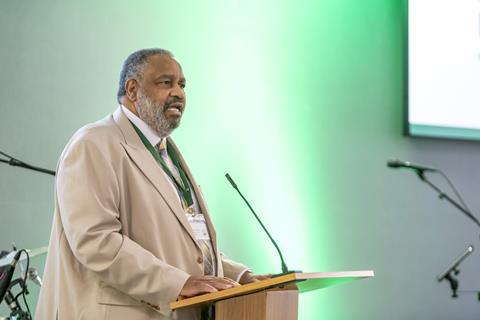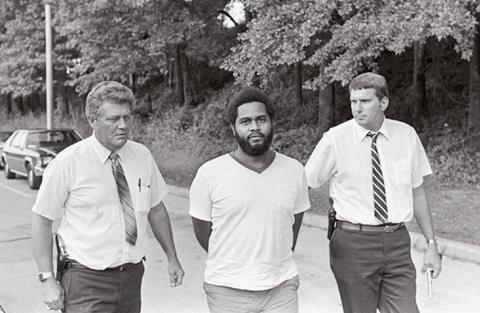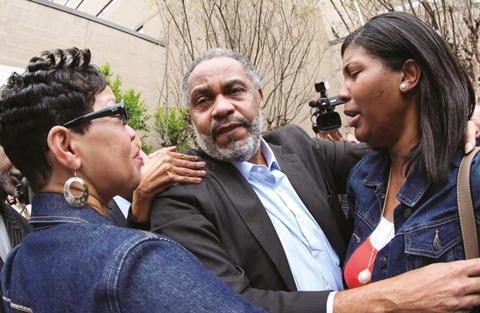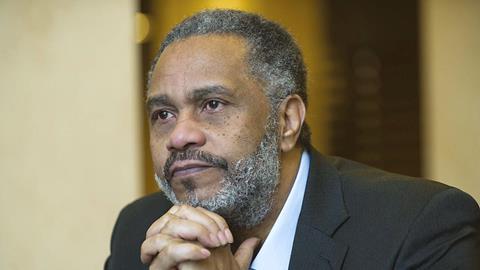Sentenced to death for a crime he didn’t commit, Anthony Ray Hinton spent 30 years inside an Alabamian prison waiting to be executed
Death row is designed to mentally destroy you. That claim isn’t made by a researcher or activist, but by a man who spent most of his life imprisoned in a tiny cell, waiting to die.
Committed Christian Anthony Ray Hinton doesn’t use the word “hell” lightly; nevertheless, that’s what three decades of solitary confinement in William C. Holman Correctional Facility in Alabama, was like, he says.
Hinton was convicted of murdering two fast food restaurant managers and sentenced to death at the age of 29. There was no fingerprint or eyewitness evidence to condemn him, and Hinton’s boss testified in court that, at the time of the murders, Hinton had been working in a warehouse 15 miles from the scene of the crime.
He had no history of violent crime and a polygraph test exonerated him. So how could such a serious miscarriage of justice have taken place?
Many would point towards America’s justice system, which has long been described as “broken” by campaigners. But that isn’t how Hinton sees it. “The criminal justice system in America is not broken. It is working exactly the way it was designed to work, and that is to put people of colour back into slavery.” He adds that when his sentence was handed down, the prosecuting lawyer muttered a little too loudly in open court: “We didn’t get the right n***** today. But at least we got a n***** off the streets.”
Once locked up, Hinton held what he calls a three-year long “pity party” (who could blame him?). But after that he found a new purpose, managing to rekindle his Christian faith in the face of unimaginable pressure.
While incarcerated, he witnessed 54 of his fellow inmates being marched towards the electric chair. Hinton could smell burning flesh – the stench of death – coming down the corridor towards him. He knew he could be next, but he chose to believe “the God that I love will never allow me to die for something that I didn’t do”.
So how did he cope? “Faith keeps you from getting caught up in everyday trauma, because your life is so consumed with trying to live like Jesus. And it was no different for me on the row. I had a job to do, and that was for those men to see Christ in me. I figured death row was the best place to not only mention God’s name, but to talk, pray and show that faith.”
After 30 years of support from family and friends, and a decade of campaigning by the Equal Justice Initiative, the United States Supreme Court unanimously overturned Hinton’s conviction in 2015.
After not seeing daylight in years, his first words on leaving jail were: “The sun does shine!” The phrase became the title of his bestselling memoir, which received endorsements from Oprah Winfrey, Desmond Tutu and Sir Richard Branson.

Last month, Hinton, now 66, shared his inspirational story in the UK. As he addressed Christian leaders at High Leigh Conference Centre, jaws were on the floor. A talented public speaker, Hinton vividly recounted his ordeal. After lunch, we met upstairs to continue the conversation.
He speaks in a thick southern accent, often beginning sentences with “I truly believe…” I’m struck that seven years on from his release, he’s still waiting for an apology from the authorities, and that no compensation has been forthcoming. Yet there isn’t a trace of bitterness in him. Christian forgiveness is scandalous.
What are your memories of being arrested?
I had the privilege of a great life. I loved playing sports and was looking forward to getting married one day.
The police came up to me and said they had a warrant for my arrest. I asked: “What are the charges?” And they replied: “We’ll explain it to you later.” They put handcuffs on me and charged me with two counts of first-degree capital murder.
Were you hopeful that justice would prevail and the authorities would realise they’d made a mistake?
Absolutely. Like most African Americans, I still had that glimpse of hope that they would come to their senses and realise they got the wrong person.
I answered their questions truthfully. But they were so fixed on making somebody pay for the crime. It wasn’t about making the right person pay.

That’s such a shocking thing: for a police officer to have so little regard for the truth.
I’ll be honest with you. When he said that, it didn’t shock me. That’s the system we live under in America. There doesn’t have to be evidence.
I didn’t have the money to hire a decent lawyer, and in the United States, the justice system is built around who you can afford to hire.
In America, they treat you better if you’re rich and guilty, opposed to if you’re poor and innocent. I was poor and innocent.
I was set free but I will never be free. Every time Alabama gets ready to execute someone, I relive that 30 years over and over again
How did they convict you?
The police told me: there’s five things they’re going to convict you on. You’re black. A white man is gonna say you shot him. You’re gonna have a white prosecutor. You’re gonna have a white judge. And you’re gonna have an all-white jury. The police officer said: “Do you know what that spells? Conviction, conviction, conviction.”
Even to this day, if I could meet that police officer again, I would shake his hand, because he was dead on the money.
What struck me is he never said: “We know you did it.” He never said anything incriminating, like: “We’ve got your fingerprint,” or: “We got an eyewitness.” He based everything on black and white. It really boiled down to race. The system can come and get you at any time, and it came and got me aged 29.
What was the reaction of your family when the sentence got handed down?
My mother was devastated, and I was more worried about her than anyone else. I didn’t know whether she fully understood that they had just sentenced her baby boy to death.
I think my family was shocked because I was brought up to believe that if you haven’t done anything wrong, you have no fear of the police. I told the truth that day, and that truth cost me 30 years of my life. And had it not been for God’s grace and mercy, it would have cost me my life as well.
Were you brought up with a strong faith?
Oh, absolutely. I can go back to the age of four – my mother did not play when it came to religion!
I grew up with a sense that we can’t live in this world without God. Only God has the ability to make it rain, only God has the ability to make the sun shine.
After so many years of being brought up in a religious family, my faith came easy. I believe God’s word; I believe that God is going to have the final say. So when I got arrested and was found guilty, I was angry with God. I couldn’t understand it.
Your anger with God carried on into your first few years in prison. How did you deal with that?
I mean, you sit there and try to make sense of it all.
When I got to death row, the only book they would allow you to have was a King James Bible. I threw it on the bed; I wasn’t going to read it. For three years I refused to talk about God or even mention God’s name.
Then I realised that God didn’t need me, I needed God. I realised that no matter what, God loves me. And God was going to protect me. So I got over my pity party, I came to my right senses and I began to pray. I asked God to forgive me. And I began to say: “Lord, if it is your will, I ask you to release me from this place.”
I would pray for the men who I got to know on death row. My faith kept me strong and made me see: if you believe in God, what are you sitting here worried about? Just wait on God, he will come and deliver you.
Tell me about the man you befriended on death row.
His name was Henry Francis Hays. I had been talking to him for two weeks without realising he was a Ku Klux Klansman and his father was a grand wizard.
I got a note from someone asking me if I knew who I was talking to. Turned out this was the Klansman who had hung a young black kid – of all the murders, this was the most gruesome one that I had ever encountered.

Some of the details are too gruesome to discuss, but in summary, Henry was incited to violence by his parents and, in 1981, abducted and lynched a 19-year-old black man in Mobile, Alabama. When you discovered that he was guilty of such an abhorrent, racist crime, how did you feel?
My mum had taught me that no matter what someone does in life, they still deserve compassion, love and understanding. She would always say: “No matter what you do, I’m still gonna love you. And no matter what you do, God still loves you.”
I had to ask myself: Did it matter who he was and what he had done? If I was truthful to my belief, the answer was: “No.” I had to remind myself of what Jesus said: “He who is here without sin, let him cast the first stone” [John 8:7]. I couldn’t throw a rock at him. I began to talk to him even more.
But how could you show love to someone who had done such horrific, racist things?
Because of my upbringing, and the way I interpret the Bible.
I felt it was the perfect opportunity for me to put into action what I truly believe. Love him, pray for him, talk to him, show him that he was not what he had been taught he was.
I realised that he was never loved, not even by his mother. So I knew that it would take some time. But for me, as a black man, it wasn’t a hard decision. Because the Bible that I read, the Bible that I love, says my job is to love people.
What happened to Henry’s parents?
One day, his mother came to visit the prison…and she didn’t leave. She died of a massive heart attack. When his mother passed, we rallied around him, right there on death row, and tried to console him.
About three months later, his father came to visit. Henry begged me to come over to his table. He introduced me to his father as his friend. After the visit, Henry was sad, and I asked him why. He told me his father said: “Don’t ever invite a n***** to a table I’m sitting on.”
Two months later, his father came again. And he died of a heart attack while inside the prison.
Later I said: “Henry, I don’t mean no disrespect, but both of your parents died on death row. It’s like God said to your parents: ‘Since you made him go out and commit that heinous crime, I’m sentencing you to death.’”
We began to talk and talk. I could see the hatred that he once had was leaving him. I referred to him as my brother. He referred to me as his friend.
Before his execution, he wrote to the warden and requested I would be with him on his last day. And I did that. We said our goodbyes. But what struck me was the words he said before he was executed: “All my life, my mother, my father, my community, taught me nothing but hate.
And the very people they taught me to hate are the ones who, for the last 15 years, have showed me nothing but love. And tonight, as I leave this world, I leave knowing what real love feels like.”
And they executed him.
I truly believe that God brought me to death row to meet Henry, to show him that love has no colour.
I truly believe this day that Henry is sitting up in heaven. I truly believe that his dad and his mother never did ask for forgiveness, they never changed and they are burning in hell.
We love to say: “It takes a village to raise a child.” And I wonder where that village was when this young boy was being taught to hate. We ought to care more about children and we should learn that there is no room for hatred, especially if you’re a believer in Jesus Christ.
It took 30 years for you to be released. Why don’t you feel angry that you were locked up for so long?
Because I stopped thinking about me. And I realised that God had chosen me to carry out a mission. I am proud that he chose me to go and meet Henry, and to show him what real love was all about.
You’ve had seven years of freedom. How have you found adjusting to life outside of prison?
The Bible says: “I can do all things through Christ who strengthens me” [Philippians 4:3, NKJV]. And “without Christ, I can do nothing” [see John 15:5]. The day I was released, I knew that God was going to pave the way for me.
You have to truly believe that God brought you from point A, and he’s not going to abandon you. He’s gonna see you through it. And so with me, I am dealing with post-traumatic stress syndrome [PTSD]. I haven’t had anyone treat me.
But I often tell people I have the best psychiatry in the world – my heavenly Father who leads me and guides me every day and who continues to give me strength.
You used the word ‘freedom’. I was set free, but I will never be free, because of the PTSD. Every time Alabama gets ready to execute someone, I have to relive that 30 years over and over again.
Seventy per cent of American Christians are in favour of the death penalty. How do you hope to change their minds?
I’ve got to keep telling them that it is not of Jesus. A Christian will never be for the death penalty. True followers of Jesus Christ believe he hasn’t given us the authority to take a life. He has only given us the authority to try and save a life.
Common sense tells me that we have executed innocent people. I would rather a person have life without parole and have the ability to try and prove his innocence, because once we take a life, it is gone forever.
To hear the full interview listen to Premier Christian Radio at 8pm on Saturday 5 November or download ‘The Profile’ podcast








































No comments yet